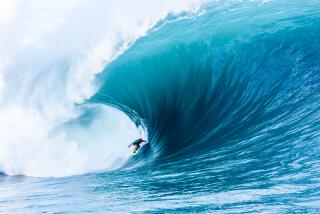Sailors Get Second Chance
- Share via
SANTA CRUZ — Charlie Ogletree scrubs the hulls of his catamaran, inspired by a lingering sense of failure. His sailing partner, John Lovell, remembers the taste of defeat as he checks the weather forecast each morning.
Four years after barely missing a medal at the Atlanta Olympics, the two are spurred by a notion of unfinished business as they try to win a spot on the U.S. sailing team for the Sydney Games.
Heading into today’s final day of competition, Ogletree and Lovell were dominating the Olympic trials in the Tornado class. Only one team is allowed to represent a country at the Olympics in that class.
The trials, in the Pacific Ocean off this tourist town about 75 miles south of San Francisco, began last weekend and finished up today.
Four years of exhausting work, both on and off the seas, has been inspired by one day at the 1996 Olympics. In third place heading into the final day of those games, Ogletree and Lovell had two bad races and fell to eighth.
“We just screwed up, basically. We had a bad start, and once we got behind we started taking risks and that got us more behind,” Ogletree said. “It’s been a pretty good motivating force. You get that close and you want to try again.”
Since 1996, they have traveled the world competing in international events. And they have spent countless hours pleading with corporations and philanthropists to spend money on a boat that probably will never appear on TV.
Lovell has put his job as an accountant on hold during tax season so he can compete in the Olympic trials. He took some time off after the 1996 Games to decide whether he could devote another four years to sailing.
“I reflected for about a year,” he said. “After a year, I knew I wanted to do it again.”
Tornado is the fastest Olympic sailing class, with the double-hulled boats sometimes reaching 30 knots (35 mph) on a windy day. The Tornado competition has been in the Olympics since 1976.
Lovell, from New Orleans, is the skipper. His day is spent strapped by his feet to a 320-pound boat, trying to steer and take advantage of wind currents.
Ogletree, who grew up in Columbia, N.C., but now works as a sailmaker for Ullman Sails in Newport Beach is the crew. He hangs off the side of the boat, getting slammed occasionally by waves as he maneuvers a 272-square-foot sail.
It’s a sport in which capsizing is a constant risk, a sport in which a knowledge of aerodynamics can be just as valuable as a strong set of shoulders. Competitors wear suntan lotion under hoods, wetsuits and fleece vests that ward off the cold.
Ogletree and Lovell were born on the same day--Oct. 11, 1967. They both started sailing as youngsters, guided by fathers who loved to sail.
Lovell’s father, who owns the accounting firm at which John works, competed in the 1980 Olympic trials. John’s brother, Andy, competes in the Laser class, and will be trying to earn an Olympic spot in those trials in mid-April in San Francisco.
Ogletree also has a boss who understands that he needs to be away from work for long periods. His boss, Jay Glaser, also is his coach--and was a silver medalist in the Tornado class at the 1984 Los Angeles Olympics.
As with many low-profile sports in the United States, there’s little money available. Ogletree and Lovell are content to have enough money to keep competing and to pay rent on the Santa Cruz apartment that’s been home since Feb. 1, when they began training at the trials site.
They also know sailing won’t make them famous, at least in their own country. They get asked for autographs in Australia, but at home they’re far from the spotlight.
Glaser’s wife, P.Z., already has earned a spot on the sailing team for Sydney.
“You do it for yourself, for the chance to be part of the Olympics and march into the stadium,” he said. “Sailing is not a spectator sport, that’s just the way it is.”
Lovell, who led College of Charleston to a national championship in 1986, had his brief taste of fame at the Atlanta Olympics.
“I’ve never really been in the limelight,” he said. “The last Olympics we were in the limelight a bit, and I don’t know if I liked it.”
More to Read
Go beyond the scoreboard
Get the latest on L.A.'s teams in the daily Sports Report newsletter.
You may occasionally receive promotional content from the Los Angeles Times.






